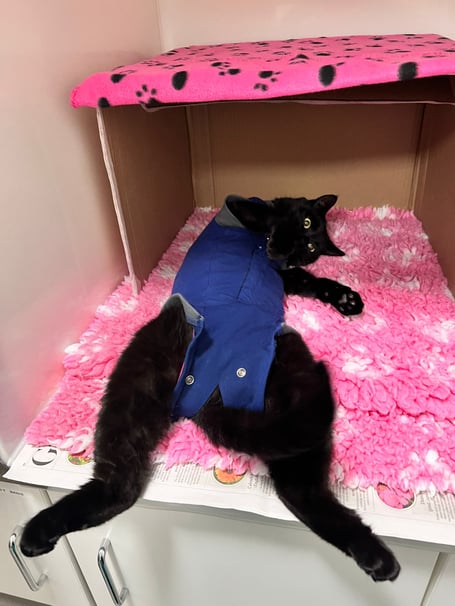The aptly named ‘Dart’ was brought into our Dartington surgery after her owners found her hiding under a chair with difficulty breathing. Dart presented with a high heart rate and a very rapid respiratory rate. There were no obvious physical injuries and so she was placed into our oxygen therapy kennel for stabilisation. This provides a constant, measured flow of oxygen and monitors the humidity and temperature, making sure patients are comfortable.
Our vet Alastair took an x-ray of Darts chest and also ultrasound scanned her heart. Whilst the heart looked normal, there was a lot of fluid in the space between the lungs and chest wall (known as a pleural effusion). This fluid needed to be drained under sedation to ease her breathing: we managed to remove 210 millilitres of fluid using a procedure called thoracocentesis. When examined under the microscope, the sample contained a large number of pus cells, leading to a diagnosis of pyothorax. Because the body can continue to produce this type of fluid, the best option for Dart was to have a chest drain placed (or two, in her case), which allowed us to regularly remove any excess build-up.
Dart was a super patient, who loved a fuss, and tolerated the regular draining and nurse checks performed during her stay with us. In fact, her favourite position was to lay on her back purring! Despite having a concoction of oral medications and antibiotics, Dart took it all in her stride and also modelled the South Moor Vets pet t-shirt like a pro, which stopped her pulling out her drains.
With regular draining and careful monitoring, Dart’s breathing gradually returned to normal. Once the amount of fluid being removed had reduced to a safe level, the drains were taken out.
Dart spent six days hospitalised in our cat ward and the whole nursing team became very fond of her upside-down antics. As a GOLD status, cat-friendly practice, we were pleased to see the measures we have put in place resulted in a very relaxed cat during her stay, who was a pleasure to look after!
After almost a week in our care, Dart was finally ready to return home a much healthier, happier cat. She has since continued to do very well and is now back to her usual adventurous self. Although the exact cause of a pyothorax is not always clear, it serves as an important reminder: if your pet’s breathing ever seems unusually fast or laboured, it is vital to seek veterinary attention as soon as possible.





Comments
This article has no comments yet. Be the first to leave a comment.